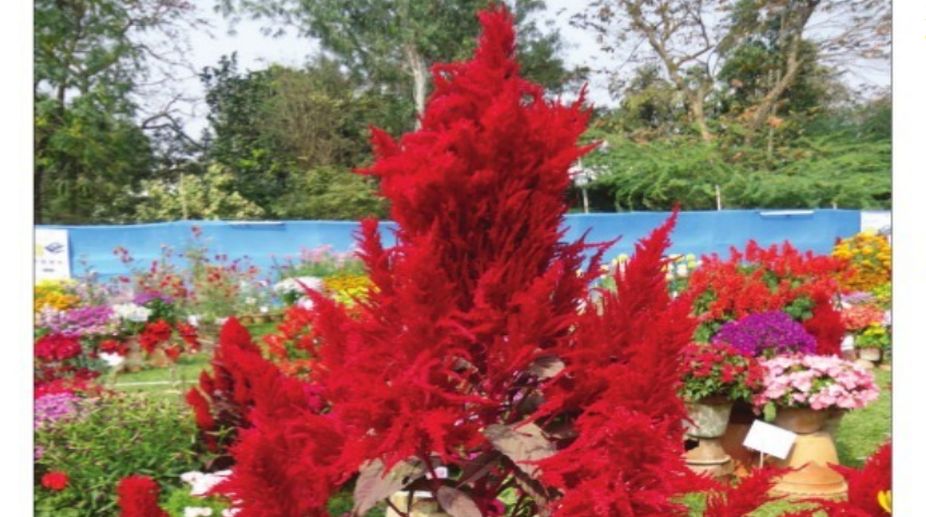Visiting a society where a unique genetic heterogeneity of plants reside, each with its own features, that include flowers, crops, trees, saplings and bonsais, is a delight to the eyes. Covering 21 acres of land in a bustling part of the city, the Agri Horticulture Garden of Kolkata is known for its fabulous collection of trees, flowering plants and other varieties of vegetation. It has an impressive infrastructure, which makes it one of the well-maintained gardens across the country. The place is filled with lush greenery till the point the eyes reach.
The place encompasses so much greenery that, even the sign boards in the parking area reads Vehicles should be parked facing the flowers! It looks greener as a change from the grayscale city that we live in. The narrow winding roads leading through the greenery, flanked by different species of trees like the Ashoka, the panthapadap, the Brazilian Ironwood to name a few, attracts myriad visitors. It seems like some exotic location by Upendrakishore Raychaudhurys iconic characters with Goopy-Baghas magical clap.
Advertisement
No beauty can challenge the beauty of flower such is the creation of nature. To brighten the mood with soothing fragrances and beautiful ambiance, the city of Kolkata spectacled mixed bag of flora exhibit in the Agri-Horticultural Society of India recently in February. Founded by Rev. Dr. William Carey in the year 1820, the Agri-Horticultural Society of India accomplished 187 years of its proud existence. Close to its bicentenary year, the diversity of horticulture was seen locked up through the hundreds of seasonal flowers not without perennial flowerets but fruits and vegetables, wide range of foliage plants, cacti and bonsais grown in pots. The visitors took pleasure amidst such vivid hues of flora.
This extraordinary competition has been taking place since 1828 every year and remains a prominent fixture of Kolkatas happening. This is a gala event where around 2000 entries and 16,500 exhibits including edible vegetable are on display.
The Annual Flower Show organised by the society is the worlds oldest flower show in existence. The exhibit is equipped with plants, shrubs, succulents, cactus, orchids, bonsai, vegetables, uprooted vegetables, seasonal flowering and non-flowering plants, cut flowers, fruits, medicinal plants and many more. Besides, north-eastern states like Meghalaya, Mizoram, Sikkim, Arunachal Pradesh also take part in this show with their exotic orchids and other plants, and numerous species.
The society is categorically divided into blocks, with each having their own homes like; the Rose garden, Xero garden, Orchidarium, Darbhanga house and Bhesaj Udyan. Various techniques such as Japanese flower arrangements, bonsai trees, as well as exhibition of various vegetable arrangements were the highlights of the annual flower show this year.
It was a rare privilege to the people of Kolkata and its suburbs to see roses from the different parts of the country as well as more than 200 rose pots by prominent rose growers. Also a huge quantum of cut roses was competing during this show. Visitors were treated to a variety of flowers from different parts of the states, which included flowers of bright colours, reddish pink, purple, dark blue. The single stalks large Daliahs in attractive hues were the charm of the show and caught every eye of the visitors. Daliah cactus – a delightful variant of daliah was noteworthy for its spiky thin petals, whereas the bunch of chrysanthemums was a riot of colours at the garden.
The Silver cocks comb, is known for its bright colours and also lasts longer than normal flowers. Some red flowers blooming in an inverted position looked as gorgeous as a chandelier with their petals hanging down. In the midst of lilies and roses, and pleasing scents, one might think that one has entered the Garden of Eden. There were tiny pollinated starflowers in blue and pink which seemed as ethereal as fallen stars. Some of the notable plants on display were Elephant Foot Tree whose base-stem looks like elephants foot, Mad tree whose all leaves are dissimilar in shape, size and its structure. Monodora a beautiful rare plant of West African origin bears highly ornamental orchid like flower and it is very rare in India. Like these plants there are many more uncommon plants which attract all nature lovers. Besides plethora of flowers, winter annuals like Acrolinum, Arctotis, Gazania, Rudbeckia. Cyclamen, Molucella and Mimulus were also seen. Apart from the flower lovers there were also some specially-abled children who had come to witness the aura of the place. Some other school students were also present there. The bonsai section caught the attention of all. There were wide varieties of bonsai, beautifully grown in small pots among. Wood apple, Fleus Microcarpa, and Carmona were the notable ones. The presence of the butterflies and the bees collecting nectar from the flowers created an imagery of Paradise.
Besides fashioning flower shows, the Agri-Horticultural Society of India (ASHI) is also acknowledged for organising year round programmes. The ASHI arranges for summer and winter garden competitions, House Plants Show, Mango Mahotsav and many more. It also renders advisory services to plant lovers across the city to build the bridge between nature lovers and nature. Such flower shows and competitions are organised to encourage the people to nurture plants in their homes. Covered with lush greenery and colourful flowers, the garden offers the people of Kolkata a short respite from their hectic and mundane life to cheer up amidst florets and blossoms during this period. Wandering inside the premises, one could even hear the soothing sound of music resounding from speakers arranged by the management and for a moment all the senses will be engulfed, making one almost forget the busy city thats just outside the walls of this Garden of Eden.
(Moghoni Das, Sweta Biswas, Raunaq Borah, Sucheta Chatterjee, Madhurima Sengupta, students, Statesman Print Journalism School)











